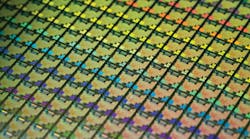Globalfoundries is suing rival TSMC for infringing on patents fundamental to how computer chips are produced, setting the stage for a legal fight with potentially high stakes for the electronics industry. Globalfoundries said TSMC is illegally using technology protected by 16 of its patents. It is looking to block a broad range of products using chips made by TSMC, including devices from Cisco, Google, Lenovo and Apple, from entering the U.S. and Germany.
The Santa Clara, California-based firm filed lawsuits with U.S. International Trade Commission, U.S. District Courts in Delaware and Texas and the Regional Courts of Dusseldorf and Mannheim in Germany. Globalfoundries alleged that TSMC is infringing on the patents in question in its most advanced chip production process, 7-nanometers, which is used in the iPhone. It also alleges TSMC is violating patents in its mature 10-, 12-, 16- and 28-nanometer nodes.
The patent infringement suits also name TSMC customers Broadcom, Qualcomm, Nvidia, Mediatek and Xilinx, and device manufacturers that purchase chips made by TSMC, including Cisco, Arista, Motorola, Lenovo, Google and Apple, which works with TSMC to make the iPhone's A-Series CPUs. Globalfoundries has been for the last decade fighting to gain ground on the TSMC, its main rival in the made-to-order chip market, and hold its ground against Samsung.
Globalfoundries is looking to ban the import of products containing chips based on its patents, in a move to highlight its U.S. investments amid an escalating trade war over China's allegedly unfair intellectual property practices. Banning TSMC—which has a production plant in mainland China—could upset the supply of chips used in all sorts of technology, ranging from Cisco switches and Lenovo PCs to smartphones like Apple's iPhone and Google's Pixel.
Gregg Bartlett, senior vice president of engineering and technology at Globalfoundries, said his company had pumped more than $15 billion into its U.S. operations in the last decade as other chip manufacturers have moved to China to help cut costs. "These lawsuits are aimed at protecting those investments," Bartlett said in a statement Monday. Globalfoundries runs its most advanced chipmaking plants out of Malta, New York, and Dresden, Germany.
The lawsuits underline how critical TSMC has become to the electronics industry as its golden rule for building smaller, faster and cheaper chips, Moore's Law, slows down. TSMC is the No.1 contract chip manufacturer in the world, serving more than 450 customers and making about $34 billion in annual sales. It has also taken the lead in making the most advanced chip technology from Intel, which is fighting delays in the development of a rival 10-nanometer node.
TSMC has been trying to strengthen its stronghold in outsourced chip production by outspending rivals in recent years, with its capital investments estimated to be $11 billion in 2019. TSMC plans to ramp up production of its 5-nanometer node in the first half of 2020 so it can get inside Apple's latest iPhones. The company, which made more than $11 billion in profit in 2018, also plans to add 3,000 jobs to support its business growth and technology development.
Globalfoundries, the No.3 player in the contract chipmaking market, has been squeezed by TSMC's spending. Last year, the Silicon Valley company halted its 7-nanometer development due to the skyrocketing costs. That caused some customers, including AMD, to move 7-nanometer chip production to TSMC. Samsung, which has boosting its investment into the foundry business, holds about 20% of the total market, double the market share of Globalfoundries.
Thomas Caulfield has cut costs and curbed spending on research and development since he was named CEO of Globalfoundries in 2018. The former head of its state-of-the-art factory in New York, Caulfield is pushing for bigger profits by leveraging its leadership at the 14-nanometers and 22-nanometer for the IoT and 5G. Globalfoundries has also been forced to cut hundreds from its headcount and sell assets including its custom chip business since last year.
Globalfoundries is also looking for "significant damages" in the patent infringement fight. The company alleges that TSMC has made "tens of billions of dollars" from selling chips using the stolen technology. TSMC currently commands 49% of the market for made-to-order computer chips, according to Trendforce. Globalfoundries holds close to 10% of the $60 billion business, which has been struggling to grow over the last year due to trade tensions.
"For years, while we have been devoting billions of dollars to domestic research and development, TSMC has been unlawfully reaping the benefits of our investments," Bartlett said. "This action is critical to halt TSMC's unlawful use of our vital assets and to safeguard the American and European manufacturing base."
The full list of lawsuits and patents asserted by Globafoundries is available here.

